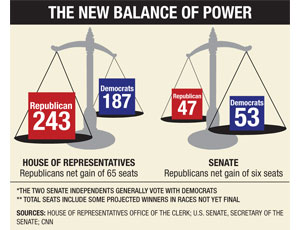Republicans’ takeover of the House and gains in the Senate could spell bad news for construction’s goal of seeing large funding increases for infrastructure programs in 2011.

With some races still unsettled, the GOP projects a net increase of 65 seats, which would total 243 House seats. Democrats did hang on to the Senate, though their majority dwindled to 53 from 59.
Among the Democrats’ House casualties were three committee chairs, including Transportation and Infrastructure panel leader James Oberstar (Minn.), a fixture on the committee for more than 30 years.
Jeffrey Shoaf, the Associated General Contractors’ senior executive director for government affairs, says, “It was a ‘wave’ election that was driven by national issues, and members of Congress are going to be very careful how they vote on big national issues in the future.”
A central construction focus in the new Congress is infrastructure legislation. Leading that list is surface-transportation reauthorization, followed by a multiyear aviation bill and appropriations.
The Democratic-controlled 111th Congress failed to pass any of those bills on time. Stopgap extensions are keeping programs running.
Those bills are on the table for the new Congress. But the GOP sees the results as endorsing their aggressive anti-spending stance. Republicans are likely to try to hold down the size of any spending measures next year.
“It’s an uphill battle. There’s no question,” says Jay Hansen, National Asphalt Pavement Association vice president for government affairs. “The Republican platform of ‘smaller government, cut taxes’ runs totally against the grain of a bigger transportation program and an increase in user fees,” he says.
Pam Whitted, National Stone, Sand & Gravel Association vice president for government affairs, says, “I think it’s going to be a time of reduced spending, focus on the economy and growth, and jobs.” For surface transportation, it probably means “a much-slimmed-down bill,” she adds.
The election’s fierce partisan fights may well persist in the new Congress. Still, some construction officials hope Republicans will seek compromises with Democrats to show voters tangible accomplishments. Whitted says, “What the American people said is, ‘We want you guys to work with each other to get things done for America.’ ”
President Obama said on Nov. 3 he sees “a whole bunch of areas” of possible agreement and cited energy policy.
New House Committee Chairs
Construction executives hope infrastructure will be another area of common ground. Shoaf says House transportation committee leaders may see an opportunity to do a deal on the three-years-overdue aviation bill. He says the panel’s expected new chairman, John Mica (R-Fla.), and top Democrats will want “to get some points on the board so that they can work together and pass things.”
Mica says his priorities include passing a long-term highway-transit measure and aviation and water-resources bills. Industry observers expect Mica’s highway-transit bill to be smaller than Oberstar’s $500-billion 2009 proposal.
Jerry Lewis (R-Calif.) is likely to become the new chairman of the House Appropriations Committee. Lewis, who led the panel in 2005-06, endorses returning to 2008 spending levels. Rep. Dave Camp (R-Mich.) is in line to lead the tax-writing Ways & Means Committee.
Geoff Burr, Associated Builders and Contractors’ vice president for government affairs, says, “The tax arena seems to be the one place where something probably gets done in 2011.”
Looking at environmental issues, Steve Hall, the American Council of Engineering Companies’ vice president for government affairs, says, “Climate-change legislation is not likely to advance at all over the next two years.” But Hall sees “a chance [that] perhaps a consensus energy bill or perhaps multiple energy bills could be possible.” Such bills could have incentives for energy efficiency, nuclear power and renewables, he adds.
Unions Focus on Jobs Bills
The outlook is grim for the Employee Free Choice Act (EFCA), a priority for labor unions. The bill, which would make it easier for unions to organize non-union companies, has been blasted by congressional Republicans, contractor groups and other business organizations, which call it the “card check” bill. “We can put EFCA on the shelf for a while,” says painters’ union President Jim Williams. “EFCA would have been great for us in a perfect world, but we’re not in a perfect world these days.” He adds that creating jobs “is the priority.” Unions will push for transportation and other jobs bills.



Post a comment to this article
Report Abusive Comment